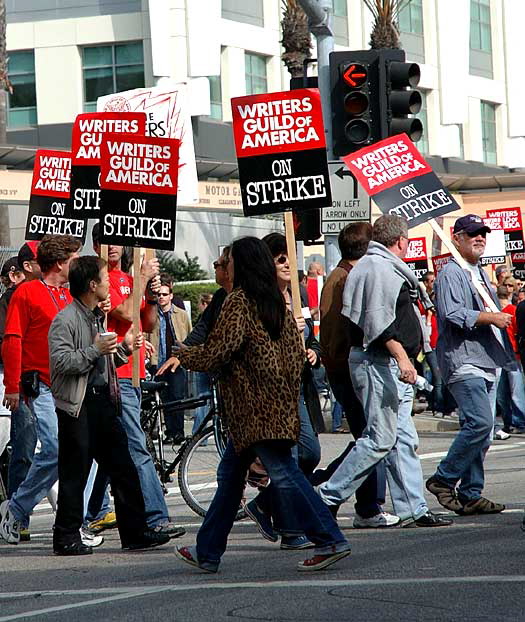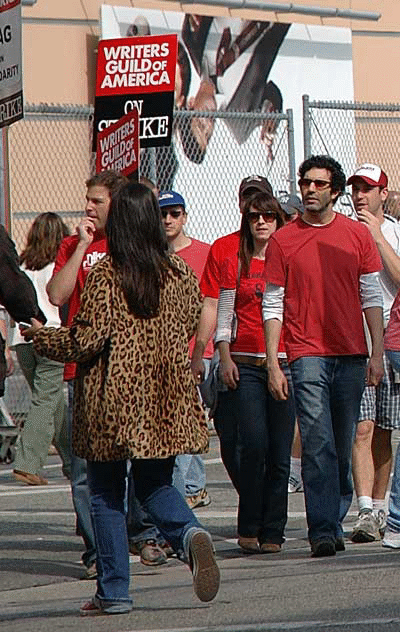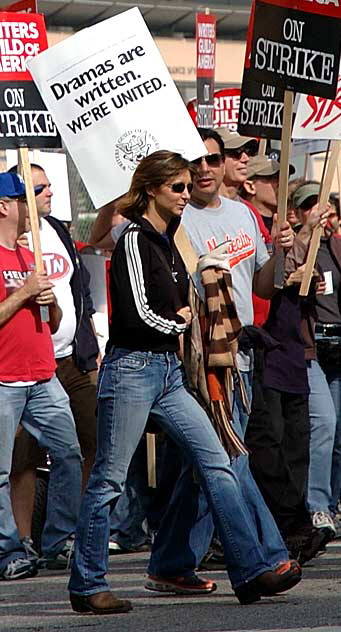|
|
|
|
 |
 |
|
Photography
|
|
 |
 |
|
Friday, November 9, 2007 – On Strike!
On August 27, 1950, President Truman ordered the Army to seize all the nation's railroads to prevent a general strike, and the railroads were not returned to their owners until two years later. This is not that dire - the Writers Guild of America, the screenwriters, are on strike, supported by the Screen Actors Guild and others. We'll have reruns on television, and new movies will be delayed. President Bush will not seize the studios. And strikes are a bit different out here. The scene at the main gate of 20th Century Fox, Pico and Motor –
|
 |
|
|
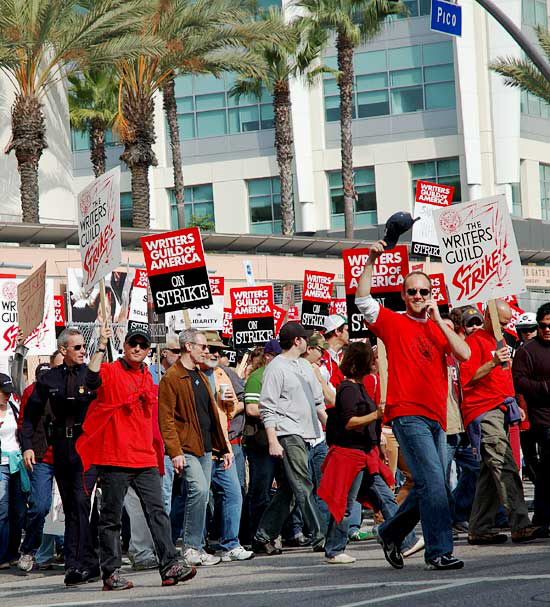 |
 |
 |
|
Friday, November 9, 2007, Reuters –
Thousands of Hollywood screenwriters on strike against film and TV studios rallied outside 20th Century Fox on Friday in their biggest collective show of force yet as pressure mounted on both sides to resume contract talks.
With the walkout in its fifth day, the greatest impact continued to be on scores of prime-time television shows where production work has been thrown into disarray, especially after writer-producers in charge of those programs refused to cross picket lines.
The writer-producers, also called show runners, are themselves on strike as members of the Writers Guild of America (WGA). But management insists they are obligated as producers to continue performing non-writing duties.
After many show runners publicly rebuffed studio calls for them to return to work this week, the studios issued breach-of-contract notices informing them their producer salaries would be cut off and warning of possible legal action, industry sources said.
In a separate move widely seen as a hard-ball tactic by management, some studios also began suspending scores of long-term development deals with writer-producers. …
|
|
|
 |
|
|
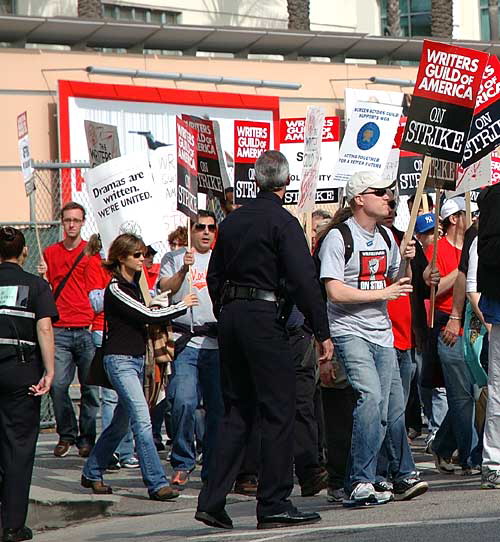 |
 |
|
|
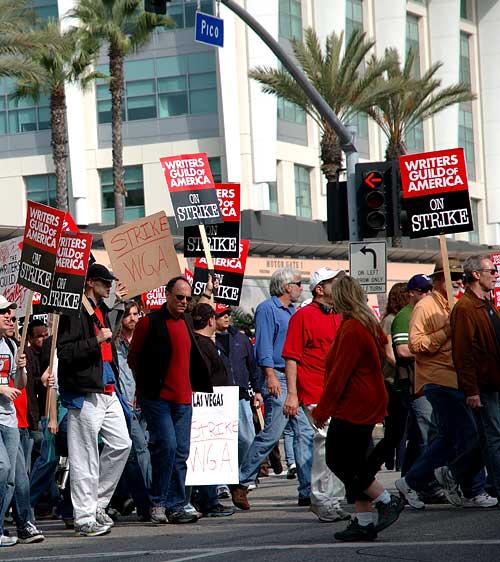 |
 |
|
|
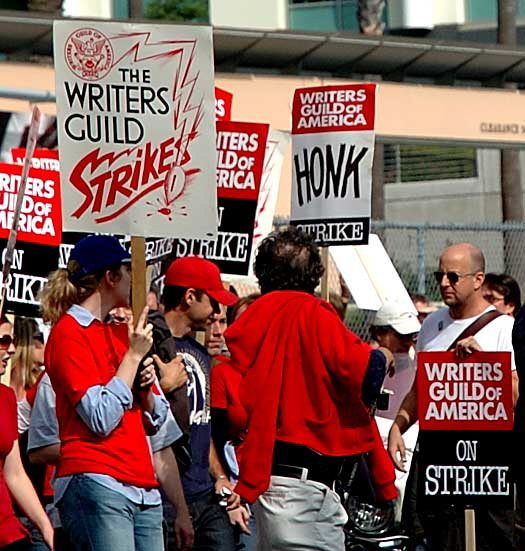 |
 |
 |
|
Note:
The irony is that this is the studio that gave us Cleopatra in 1963, the film that almost put the studio under – directed by Joseph L. Mankiewicz, from a screenplay adapted by Sidney Buchman, Ben Hecht, Ranald MacDougall, and Mankiewicz, from a book by Carlo Mario Franzero. But it wasn't the writers. The film starred Elizabeth Taylor, Richard Burton, Rex Harrison, Roddy McDowall and Martin Landau – expensive people. Elizabeth Taylor's record setting million dollar contract ballooned to seven million, what with the production delays, and then Twentieth Century Fox's share of the receipts, twenty-six million, returned just over half of the total cost of the thing. The studio had to retrench – they sold most of the large backlot north of Pico to developers, and that's now Century City.
Mankiewicz was brought onboard after the first director, Rouben Mamoulian, was canned, and inherited a film which was already five million over budget with no usable footage to show for it. It didn't help that the actors originally hired to play Julius Caesar (Peter Finch) and Marc Antony (Stephen Boyd) left – other commitments and all that. Mankiewicz was later fired during the editing phase, only to be rehired when no one else could piece the film together, as it no longer made much sense at all.
So don't blame the screenwriters – they're okay.
|
 |
 |
|
If you wish to use any of these photos for commercial purposes I assume you'll discuss that with me. And should you choose to download any of these images and use them invoking the "fair use" provisions of the Copyright Act of 1976, please provide credit, and, on the web, a link back this site.
Technical Note:
Most of these photographs were shot with a Nikon D70 - using lens (1) AF-S Nikkor 18-70 mm 1:35-4.5G ED, or (2) AF Nikkor 70-300mm telephoto, or after 5 June 2006, (3) AF-S DX Zoom-Nikkor, 55-200 mm f/4-5.6G ED. They were modified for web posting using Adobe Photoshop 7.0. Earlier photography was done with a Sony Mavica digital still camera (MVC-FD-88) with built-in digital zoom.
|
 |
|
|
[On Strike!] |
 |
 |
|
All text and photos, unless otherwise noted, Copyright © 2003, 2004, 2005, 2006, 2007, 2008, 2009, 2010 - Alan M. Pavlik
|
|




